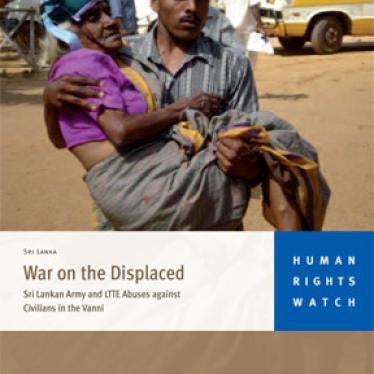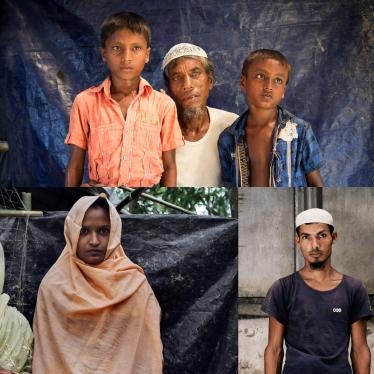Dear Secretary-General,
We are writing in advance of your upcoming visit to Sri Lanka on May 23. The Sri Lankan government's victory over the Liberation Tigers of Tamil Eelam (LTTE) signals an end to the devastating 25-year-long war in Sri Lanka. We hope it also marks the end to the numerous atrocities committed by the LTTE against the civilian population. The fighting resulted in a terrible cost in civilian lives and suffering that could have been avoided and will have continuing consequences in both the near and long-term for Sri Lanka.
While we are pleased the fighting and related deaths and injuries are now over, this will above all be a much needed opportunity to discuss both opportunities and concerns in post-conflict Sri Lanka.
We hope you will use the opportunity of your visit to bring international attention to the most pressing concerns of the Sri Lankan people. Your visit comes at a time when some 300,000 civilians who were displaced by the fighting remain in a precarious situation. This includes the wounded civilians who remain in the conflict area with inadequate food and medical care. Yet the government continues to place unnecessary restrictions on the access of United Nations and humanitarian agencies to those at grave risk. During your trip to Burma last year, you demonstrated that focused attention to humanitarian concerns can bring about considerable improvements in the delivery of humanitarian aid, including proper access for humanitarian workers.
Human Rights Watch urges you to raise the following areas of special concern, both privately with the Sri Lankan government and in your public statements:
- Providing full access of UN and humanitarian agencies to the detention camps for internally displaced persons (IDPs) and the treatment of the wounded;
- Stopping all forms of harassment, intimidation and threats against human rights defenders and journalists exposing past or present abuses;
- Ensuring protections against new violations of human rights against the Tamil population and persons the government may suspect of being LTTE members;
- Addressing longstanding concerns in the Tamil community about discrimination and the commitment of the government to treat Tamils as full and equal citizens under the law; and
- Creating an international commission of inquiry to hold accountable all sides for violations of international human rights and humanitarian law that occurred in the context of the recent fighting.
Protection of Internally Displaced Persons
Nearly 300,000 civilians are now detained in the government's closed "welfare" camps, including entire families who are prevented from leaving either for work or to move in with relatives or other families. Since the establishment of these camps in 2008, only about 1,500 people, mostly the elderly, have been allowed to leave. The government has also taken into custody an unknown number of people with alleged LTTE ties during the initial screening process or from the camps themselves. These conditions demand independent investigation.
Of special concern is the fate of displaced medical personnel who provided care to the injured in the only operating field hospital in the war zone until they too were forced to flee. Apparently because they spoke out about government shelling of the conflict zone, these doctors were reportedly arrested at the screening point at Omanthai and are thought to be detained incommunicado by Sri Lankan authorities in Colombo. Instead of praising them for their distinguished service on behalf of the Sri Lankan people, the government has detained them for allegedly disseminating false information. Given Sri Lanka's human rights record, we believe they are at risk of arbitrary detention, enforced disappearance, and torture.
We ask that you urge the Sri Lankan government to take all necessary steps to ensure the safety of all civilians and LTTE fighters taken into custody. This includes registering and providing public information about all persons who have been in LTTE-controlled areas, allowing international humanitarian agencies to participate in processing, and lifting the bans on humanitarian organizations and the media from the camps and conflict area. Those detained under the emergency or other laws should have prompt access to family members and legal counsel.
Your visit will provide you an opportunity to again remind the Sri Lankan government of its obligation to treat internally displaced persons in accordance with the UN Guiding Principles on Internal Displacement and respect their basic human rights. This includes the right to freedom of movement due all Sri Lankan citizens, and access for impartial humanitarian agencies to the centers without unnecessary restrictions.
Preventing Future Human Rights Violations
The end of Sri Lanka's long war provides important opportunities-and risks-for promoting greater respect for human rights in the country. It is important that you raise both your hopes and concerns for a future rights-respecting Sri Lanka.
The Sri Lankan security forces have a long history of human rights violations against perceived opponents, including arbitrary arrests, enforced disappearances and unlawful killings associated with the government's efforts to root out suspected LTTE supporters. It is crucial that these violations are not repeated in the context of the LTTE's military defeat, particularly in the event that remnants of the LTTE continue to conduct attacks targeting the civilian population. Respecting the rights of displaced civilians and captured combatants will have important long-term implications for Sri Lanka's future stability, sending a clear signal to Tamils that they will enjoy equal rights in post-conflict Sri Lanka.
The demand for equal treatment under law and an end to discrimination against Sri Lanka's Tamil minority was at the root of Sri Lanka's decades' long conflict, and continued to characterize treatment of civilians throughout the war. As the war with the LTTE intensified, so did pressure on the Tamil civilian population. Government authorities have arrested and detained Tamils in Sri Lanka in large numbers based almost solely on their ethnicity. Anti-terrorism legislation and emergency regulations that reverse the burden of proof and deny detainees due process have been applied disproportionately to members of the Tamil community, who have often been wrongly suspected of being supporters of the LTTE. Despite legislation that made Tamil an official language in Sri Lanka and efforts to improve Tamil language ability in official venues, language discrimination in the conduct of official business remains pervasive. Court documents, police records, and even signed confessions of Tamil suspects have been prepared in Sinhala in contravention of the law, undermining the basic rights of Tamil speakers.
As noted, impunity for rights abuses remains a widespread problem in Sri Lanka. Efforts to combat the cycle of impunity have been frustrated by decades of reliance on Sri Lanka's draconian Prevention of Terrorism Act and its almost continuous operation under a state of emergency, which subverts normal justice processes. There is an urgent need to revise or repeal this legislation. The problem is exacerbated by extreme inefficiency of the court system, the lack of effective witness protection, as well the justice system's profound vulnerability to political pressure.
We urge you to also highlight the need for greater media freedom in Sri Lanka, where journalists have come under increasing government restrictions and have been targets of violence and arbitrary arrest.
Commission of Inquiry
According to information from the United Nations, more than 7,000 civilians were killed and many more injured in the fighting since January 2009. Human Rights Watch and others have documented serious violations of international humanitarian law by both Sri Lankan government forces and the LTTE during this period. Despite repeated denials, government forces repeatedly shelled densely populated areas, including at least 30 attacks on hospitals, in the government-declared "no-fire zone"-an area where it had urged civilians to take shelter. The LTTE violated the laws of war by using civilians as human shields, using lethal force to prevent their escape, and deliberately deploying their forces in and near densely populated civilian areas. The situation for civilians was made worse by the Sri Lankan government's inadequate delivery of relief supplies and the government's refusal to grant access to the region for aid agencies as required by international humanitarian law. However, because independent observers, including the media and human rights organizations, were prevented from operating near the war zone, the information available on the fighting, and potential laws of war violations by both sides, is limited.
The Sri Lankan government's record on investigating serious human rights abuses is poor and impunity has been a persistent problem. There have been serious ongoing violations of human rights and a backlog of cases of enforced disappearance and unlawful killings that run to the tens of thousands, as described for example in the 2008 Human Rights Watch report "Recurring Nightmare." Despite this track record, there have been only a small number of prosecutions. Past efforts to address violations through the establishment of ad hoc mechanisms in Sri Lanka, such as presidential commissions of inquiry have produced few results, either in providing information or leading to prosecutions.
To address abuses in the recent fighting, we urge you to publicly express the urgent need for an independent, international commission of inquiry into the many credible allegations of laws of war violations, including possible war crimes, by both sides.
Your visit provides an important opportunity to explain in public and private what the international community expects from the Sri Lankan government and the international community. We hope you will use this occasion to publicly call for an international commission of inquiry; the full protection of internally displaced persons, including independent access to camps, former areas of conflict and to conflict-affected civilians by humanitarian and human rights organizations and the media; and specific commitments by the Sri Lankan government to address continuing human rights violations, particularly those faced by the country's Tamil minority. We urge you to make it clear that government security precautions never justify enforced disappearances.
Thank you for your consideration.
Sincerely,
Kenneth Roth
Executive Director
cc: Mr. António Guterres, UN High Commissioner for Refugees;
Mr. John Holmes, Under-Secretary-General for Humanitarian Affairs;
Mr. Lynn Pascoe, Under-Secretary-General for Political Affairs;
Ms. Navanethem Pillay, UN High Commissioner for Human Rights.







